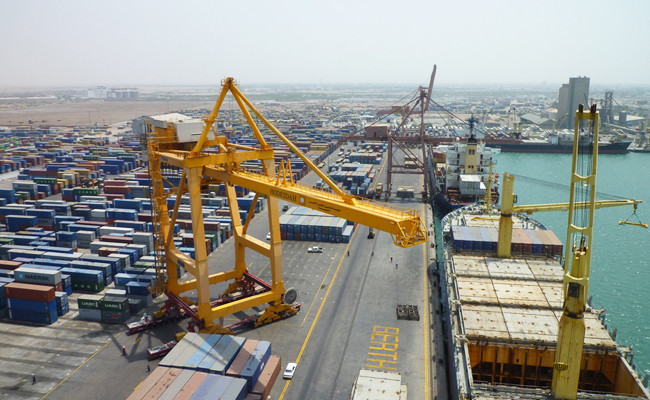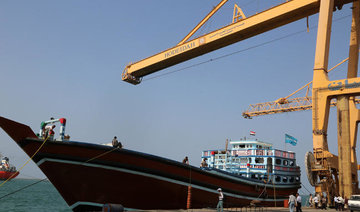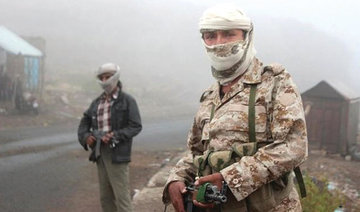DUBAI: Four mobile cranes have arrived in Houthi-controlled Hodeidah port, the United Nations said on Monday.
US Ambassador Nikki Haley said thanks to the efforts of US government agencies, the UN World Food Program (WFP), the Coalition, and aid organizations on the ground in Yemen, the ship carrying four US-supported cranes has successfully reached its destination at the port. These mobile cranes would improve the port’s capacity for offloading critical supplies, such as food and medicine, for the Yemeni people, she said.
“No one should ever have to live the way the people of Yemen are living. We thank our partners who helped us make this delivery possible so that we can help the tens of millions of innocent people who wake up each day facing hunger and disease. We call on all sides of the conflict to allow full access for humanitarian and commercial supplies, including fuel, by keeping the country’s ports open and allowing humanitarian agencies to deliver aid without interference,” Haley said.
The US-funded equipment will help to replace four giant cranes disabled by coalition warplanes in an August 2015 raid that drastically slowed the unloading of food, medicine and fuel needed by a population riven with hunger and disease.
The WFP said in a statement that a ship carrying the cranes it bought with funds from the United States Agency for International Development had arrived at Hodeidah port and were expected to be operational immediately.
“With each of the mobile cranes able to handle up to 60 tons, they will significantly boost the discharge of humanitarian cargo and other relief items,” the statement said.
The WFP said Saudi Arabia and the United Arab Emirates facilitated the transfer of the cranes aboard the WFP-chartered vessel MV JUIST to Yemen.
The cranes are expected to help ease a humanitarian crisis. Hodeidah port handled around 70 percent of Yemen’s imports, including critically-needed food and humanitarian supplies.
The United Nations says that more than 22 million of Yemen’s 25 million population need humanitarian assistance, including 11.3 million who are in acute need — an increase of more than one million people since March 2017.
Cranes arrive in Hodeidah to boost flow of food aid to Yemen
Cranes arrive in Hodeidah to boost flow of food aid to Yemen

Paramilitary attack kills 48 in central Sudan village: war monitor

PORT SUDAN: Sudan’s paramilitary Rapid Support Forces (RSF) killed 48 civilians in an attack on a village in the center of the war-torn country, a monitoring group reported Monday.
The Emergency Lawyers, a group that has documented atrocities throughout the two-year conflict between the regular army and the RSF, reported civilians were killed en masse Sunday when paramilitary fighters stormed the village of Um Garfa in North Kordofan state, razing houses and looting property.
Two drones fell in Khurmala oilfield in Iraqi Kurdistan, counter-terrorism service says

- An investigation into the incident was launched in coordination with security forces in Kurdistan
BAGHDAD: Two drones fell in the Khurmala oilfield in Iraqi Kurdistan, the Iraqi Kurdistan’s counter-terrorism service said in a statement on Monday.
Khurmala oilfield is located near the Iraqi Kurdish city of Irbil.
The Iraqi Security Media Cell, an official body responsible for disseminating security information, said in a statement that no casualties were reported and only material damage was recorded.
An investigation into the incident was launched in coordination with security forces in Kurdistan, it added.
Israeli forces fatally shoot 20-year-old Palestinian man near Jenin

- Youssef Walid Sheikh Ibrahim killed close to military checkpoint
- 42 Palestinians have been killed since Israel launched offensive in town
LONDON: A Palestinian man was shot dead by Israeli forces on Monday evening near the town of Ya’abd in Jenin governorate, north of the occupied West Bank.
The Ministry of Health reported that Youssef Walid Sheikh Ibrahim, 20, from the town of Kafr Ra’i, died after being shot by Israeli forces near a military checkpoint close to the illegal settlement of Mevo Dotan, and his body was detained.
A total of 42 Palestinians have been killed since Israeli forces launched a military campaign in Jenin town and its refugee camp in January, according to the WAFA news agency.
Since October 2023, Israeli forces and settlers in the West Bank have killed nearly 1,000 Palestinians, most of them civilians.
On Sunday, hundreds of Palestinians from Al-Mazraa Al-Sharqiya attended the funeral of Saif Al-Din Kamil Abdul Karim Musalat, 20, and Mohammed Rizq Hussein Al-Shalabi, 23, who were killed by Israeli settlers last week.
About 1 million Israelis live in illegal settlements in the West Bank and East Jerusalem in violation of international law. Their attacks against Palestinians have escalated since 2023, with 820 recorded by rights groups in the first half of this year.
Iraq plans to build 10 dams to harvest desert rains, as drought displaces 10,000 families in Dhi Qar
Iraq plans to build 10 dams to harvest desert rains, as drought displaces 10,000 families in Dhi Qar

- As water levels in the Tigris and Euphrates rivers dwindle, the aim is to store rainwater and floodwater to help boost strategic reserves
- Dhi Qar Governorate is experiencing one of its worst summers, with severe water shortages and drought forcing people in rural areas to migrate
LONDON: Iraq has announced plans to build 10 dams to harvest water in desert areas, as part of an urgent strategy to boost water security amid dwindling supplies.
The effects of climate change and the construction of dams in neighboring countries, including Turkiye, have significantly affected water levels of the Tigris and Euphrates rivers, which are vital lifelines for Iraqis.
The Iraqi minister of water resources, Awn Dhiab Abdullah, said on Monday that the dams would store floodwater and rainwater in the desert to build up strategic reserves, especially in provinces lacking in surface-water resources.
“The shortage the country is experiencing is the most dangerous in its history, forcing 12 provinces to rely exclusively on groundwater to cover their various needs,” he said.
Dhi Qar, which is in southern Iraq, has experienced one of its worst summers on record, with severe water shortages and drought forcing nearly 10,000 families in rural areas to abandon their homes and migrate to urban areas.
Abdullah said that more than half of Iraq’s desert region relies on groundwater supplies. He emphasized the importance of water-harvesting projects and the need to reduce dependence on traditional sources.
Iraqis face difficult return from Syria camp for Daesh families

MOSUL: After years in a Syrian detention camp, Ibrahim Darwish was relieved to be allowed to return home to Iraq, but his joy was quickly punctured by the harsh reality that he had to disown his sons accused of being militants.
“All I wanted was to return to Iraq,” the 64-year-old said of his time in the Kurdish-controlled Al-Hol camp, where family members of suspected Daesh fighters are held in prison-like conditions alongside refugees and displaced people.
But back home in Iraq, “I had to disown my sons. My house is gone,” he said. “I am back to square one.”
Thousands of Iraqi returnees from the camp have faced major obstacles reintegrating into their communities, their perceived affiliation with Daesh casting a dark shadow over their prospects.
They described armed groups and local authorities in some areas pressuring returnees to cut ties with relatives suspected of Daesh links as a precondition for going home or obtaining essential documents.
A lawyer for many returnees equated the pledges of disownment to denunciations, “essentially complaints by one family member against another.”
He also warned of a widespread misconception among returnees that they must comply in order to obtain identity cards and other government papers.
But a senior Iraqi official insisted that the authorities supported reintegration, including when it came to the issuance of documents.
Requesting “disownment statements has become illegal, and anyone who asks for it should be reported,” the official said.
Darwish said he was allowed to leave Al-Hol after receiving Iraqi security clearance and support from his tribal leader.
Back in Iraq, he spent the first several months at Al-Jadaa camp, presented by the authorities as a “rehabilitation” center where returnees wait for further permission to return home.
There, “we felt the most welcome,” Darwish said.
But when it was time to go home to Salaheddin province, Darwish said local authorities told him he first had to disown his sons, who are locked away on suspicion of joining Daesh — a charge he denies.
Reluctantly, he complied.
Otherwise, “how was I going to farm my land and make ends meet?” he said.
In the northern city of Mosul, one woman in her thirties said she was afraid to return to her hometown in Salaheddin, where her father was arrested upon his arrival and later passed away in prison.
She is currently squatting with her sister and children in a dilapidated house, living in fear of eviction.
When the family first returned to Iraq, she said, people “looked at us differently, just because we came from Al-Hol.”
Now her concern is obtaining new identity cards, which are essential for accessing healthcare, education and employment, and she fears she will have to disown her husband to do so.
The authorities, she said, “did well” by bringing them back from Al-Hol, where many speak of increased violence, but they must now solve the issue of reintegration.
“We need them to support us so we can stand on our feet,” she added.
Thanassis Cambanis, director of New York-based Century International, said the returnees “face a murky future,” especially since some of those tarred as Daesh families are denied documentation.
“At a minimum, collective punishment of the Daesh families is an injustice and a moral error,” Cambanis warned.
“At a maximum, Iraq’s policy creates a ripe pool of potential recruits for violent sectarian extremists.”
While many countries refuse to repatriate their nationals from Al-Hol, Baghdad has so far brought back around 17,000 people, mostly women and children.
Local and international organizations facilitated reintegration. The Global Community Engagement and Resilience Fund, a Geneva-registered organization that focuses on preventing extremism, supports several centers that have so far assisted around 6,000 returnees.
According to the fund’s Kevin Osborne, the centers provide services such as psychosocial support and vocational training.
But the growing number of returnees requires “expanded support to adequately prepare communities and enable smooth, sustainable reintegration,” Osborne said.
Noran Mahmood, of the GCREF-supported Iraqi Institution for Development, said many returnees fear “society’s refusal” to welcome them, as if having spent time in Al-Hol is a “disgrace.”
Her organization in Mosul provides counselling for the many returnees who suffer from depression, insomnia and anxiety.
Rahaf, 24, is one of the many women receiving help after years of accumulated trauma.
With the organization’s assistance, she achieved her long-held dream of furthering her education, enrolling in middle school.
“I feel successful,” she said. “I want to become a lawyer or a teacher.”





















